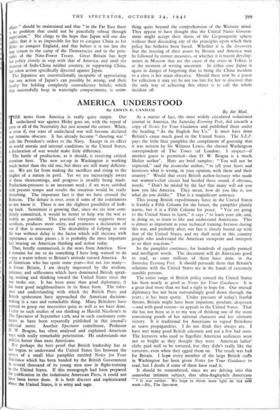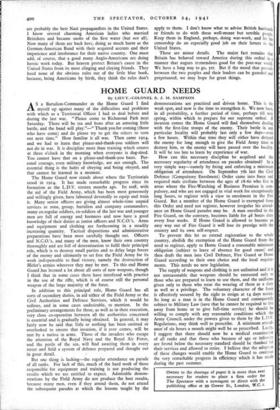AMERICA UNDERSTOOD
By ERWIN
III HE news from America is really quite simple. Our I undeclared war against Hitler goes on, with the repeal of parts or all of the Neutrality Act just around the corner. When, or even if, our state of undeclared war will become declared war remains obscure. It has already become " shooting war " with the President's orders to the Navy. Except in its effect on world morale and internal conditions in the United States, a declaration of war would make little difference.
The battle of production, as it should, is receiving critical attention here. The new set-up in Washington is working much better than the old one, but there are still many deficien- cies. We are far from making the sacrifices and rising to the heights of a nation in peril. Yet we are increasingly aware of these shortcomings, and progress is steadily being made. Production-pressure is an incessant need ; if we were satisfied with present tempo and results the situation would be really disturbing. The important fact is that we have crossed the Rubicon. The debate is over, even if some of the isolationists do not know it. There is not the slightest possibility of look- ing back. Sentiment is growing that, since we arc now com- pletely committed, it would be better to help win the war as swiftly as possible. This practical viewpoint supports more sacrifices, produces more unity, and promotes a declaration of war if that is necessary. The desirability of helping to win the war without delay is the factor which will increase with importance as time passes ; it is probably the most important fact bearing on American thinking and action today.
That, briefly summarised, is the news from America. Now it remains for me to do something I have long wanted to do —pay a warm tribute to Britain's attitude toward America. As an American who has spent some years—but not too many— in Great Britain, I am deeply impressed by the wisdom, patience, and selflessness which have dominated British speak- ing, writing and thinking toward the United States since the war broke out. It has been more than good diplomacy, it has been good neighbourliness in its finest form. The toler- ance and understanding with which the British Press and British spokesmen have approached the American decision- making is a rare and remarkable thing. Many Britishers have seemed to grasp our necessities quite as well as we have done. I refer to such studies of our thinking as Harold Nicolson's in The Spectator of September 12th, and to such cautionary com- ments as have been repeatedly published in this journal's editorial notes. Another Spectator contributor, Professor D. W. Brogan, has often analysed and explained American ways with really remarkable penetration. He understands our politics better than most Americans.
But perhaps the best proof, that British leadership has at last begun to understand the United States lies between the covers of a small blue pamphlet entitled Notes for Your Guidance which has been handed by the British Government to several thousand of its young men now in flight-training in the United States. If this monograph had been prepared for publication in the isolationist American Press, it could not have been better done. It is both discreet and sophisticated about the United States, it is witty and sage. As a matter of fact, the most widely circulated isolationist journal in America, the Saturday Evening Post, did unearth a copy of Notes for Your Guidance and published them under the heading " As the English See Us." It must have done Britain's cause much good in the United States. The S.E.P. pays the little blue pamphlet the compliment of guessing that it was written by Sir Wilmott Lewis, the shrewd Washington correspondent of The Times (of London). I suspect—if another guess is permitted—that D. W. Brogan is a much likelier author*. Here are brief samples: " You will not be expected," said the avuncular author, " to tell your hosts and hostesses what is wrong, in your opinion, with them and their country." Would that every British author-lecturer who made our women's-club circuit had heeded these sound, if obvious, words. " Don't be misled by the fact that many will ask you how you like America. They mean, how do you like it, not what do you dislike." That is a magnificent sentence.
This young British expeditionary force in the United States is frankly a Fifth Column for the future, the pamphlet plainly warns, but it is a Fifth Column for peace. " You are going to the United States to learn," it says ," to learn your job, and, in doing so, to learn to like and understand Americans. This is almost as important as your technical training, because during this war, and probably after, our fate is closely bound up with that of the United States, and we shall need in this country people who understand the American viewpoint and interpret to us their reactions."
So the pamphlet continues, for hundreds of equally pointed and intelligent words. The document will do Americans good to read, as some millions of them have done in the Saturday Evening Post. It should persuade them that Britain's relations with the United States are in the hands of extremely sensible persons.
The entire range of British policy toward the United States has been nearly as good as Notes for Your Guidance. It is a great deal more than we had a right to hope for. Our mutual diplomacy has not, been outstandingly good down through the years ; it has been spotty. Under pressure of today's fearful threats, Britain might have been impatient, petulant, desperate —and with good reason—in appeals to the United States. That she has not been so is to my way of thinking one of the most convincing proofs of her national character and her ultimate victory. It is traditional for Americans to regard Britishers as suave propagandists. I do not think they always are. I have met many good British salesmen and not a few bad ones. The lecturers who used to flagellate American audiences were not so bright as they thought they were. American ladies' clubs paid well to be tortured, but they didn't really like the torturers, even when they egged them on. The result was bad for Britain. I hope every member of the large British staffs in Washington has been given Notes for Your Guidance to read, but I doubt if some of them have read it.
It should be remembered, since we are delving into this somewhat intimate subject, that ultra-Anglophile Americans * It was neither. We hope to throw more light on this nett week En., The Spectator. are probably the best Nazi propagandists in the United States. I know several charming American ladies who married Britishers and became snobs of the first water (but not all). Now many of them are back her; doing as much harm as the German-American Bund with their acquired accents and their impatience and intolerance for their native country. One must add, of course, that a good many Anglo-Americans are doing heroic work today. But heaven protect Britain's cause in the United States from its most clinging and cloying friends. They heed none of the obvious rules out of the little blue book, because, being Americans by birth, they think the rules don't apply to them. I don't know what to advise British husbands or friends to do with these well-meant but terrible people, Keep them in England, perhaps, doing war-work, and let the censorship do an especially good job on their letters to the United States.
These are minor details. The major fact remains that Britain has behaved toward America during this ordeal in a manner that augurs tremendous good for the post-war v,orld. We have a long way to go, yet. But if the mood that prevails between the two peoples and their leaders can be guarded and perpetuated, we may hope for great things.



























 Previous page
Previous page